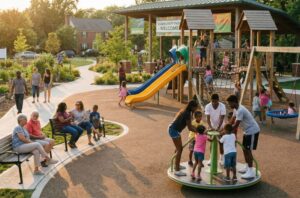Playable Cities: How Urban Spaces Are Being Designed for Spontaneous Fun
Author: Austin Stanfel
Playable Cities represent a new wave of urban design focused on embedding spontaneous fun and human-centered interaction into city streets, parks, and public squares. Their goal is to make joy, creativity, and community engagement essential elements
Social Play Post-Pandemic: Helping Children Relearn Cooperation and Turn-Taking
Author: Austin Stanfel
Children’s social play skills, especially cooperation and turn-taking, were deeply affected during the pandemic era. However, thoughtful, intentional strategies can help kids relearn and thrive in post-pandemic classrooms and playgrounds. Recent research, educator insights, and therapeutic recommendations
Play as Emotional Language: How Children Express Feelings Through Unstructured Play
Author: Austin Stanfel
Children use unstructured play as a powerful form of emotional language, expressing, exploring, and regulating their inner worlds without words. Unstructured play provides a safe, natural outlet for feelings, helping children communicate complex emotions, develop resilience, and
What ‘Play Deficit Disorder’ Means and How Communities Can Fix It
Author: Austin Stanfel
Play Deficit Disorder refers to the growing lack of opportunities for children to engage in free, unstructured play, a phenomenon with profound consequences for childhood well-being, development, and community vitality. Communities can take decisive action to reverse
The Play Personalities: Understanding Your Child’s Natural Style of Play
Author: Austin Stanfel
Children express their unique personalities through their favorite styles of play, and understanding these “play personalities” can help parents nurture their children’s strengths, support their emotional growth, and build deeper family connections. This framework, developed by Dr.
The Original Third Place Has Always Been the Park
Author: Austin Stanfel
When sociologist Ray Oldenburg coined the term “third place” in the late 1980s, he referred to the social environments that exist between home (the first place) and work (the second place). These are spaces where people gather







